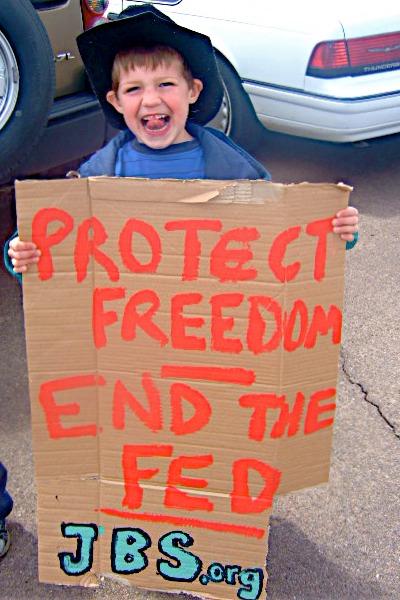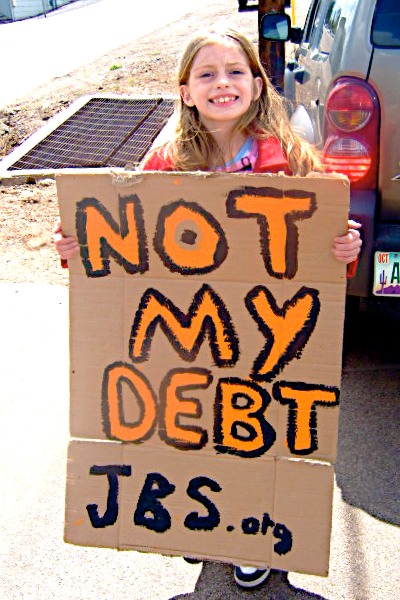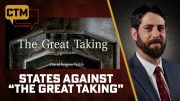
AFP news quoted Eric Odom, a Chicago-based libertarian activist and the administrator of the Tax Day Tea Party website, who said the protests were a "new day for the freedom movement."
The New York Times reported that in downtown Houston, a crowd of 2,000 filled the Jesse H. Jones Plaza and that, among them, were some who wanted Texas to secede. The Times noted that the tax protesters were joined by "anti-abortion activists, Libertarians, and fiscally conservative Republicans." Amidst a sea of American flags, hand-painted signs bore messages such as: "Abolish the I.R.S.," "Less Government More Free Enterprise," "We Miss Reagan," and "Honk if You Are Upset About Your Tax Dollars Being Spent on Illegal Aliens."
The Times quoted former Republican House Majority Leader Dick Armey, chairman of the conservative Freedom Works group, who described the tea parties as "the shot across the bow as taxpayers defend themselves against out of control government spending."
AFP reported that at a large Tea Party gathering in Washington near the White House, about 1,000 people waved placards sporting messages such as "Stop Big Government" and "Taxation is Piracy."
"My money is disappearing," said one protestor, Marilyn Henretty, a 70-year-old retiree. "We are tired of being taxed without representation."
Capital police told the rally to disperse after someone threw tea over the White House fence.
Another large demonstration drew about 1,000 people in Santa Ana, the county seat of once staunchly conservative Orange County, California. One speaker called for President Obama’s removal from office:
"The guy’s got to go," the Los Angeles Times quoted Allan Bartlett, a member of the Orange County Republican Central Committee, as telling the crowd gathered on a plaza outside the Orange County courthouse.
Fox television news, which gave extensive coverage to the event, showed footage of a crowd in Sacramento that it said numbered 5,000.

"We’re just Americans trying to get our voices heard — about too much taxation and spending, the swelling size of government, the bailouts for big business," protester Robin Todd was quoted by the Los Angeles Times at a rally outside the domed Capitol in Sacramento. "That’s European-style socialism."
The Associated Press quoted Iowa businessman Doug Burnett at a rally of 1,000 people held at the state capitol in Des Moines: "Frankly, I’m mad as hell. This country has been on a spending spree for decades, a spending spree we can’t afford."
Texas Governor Rick Perry — whose popularity among conservatives rose on April 9 when he joined state Rep. Brandon Creighton and sponsors of House Concurrent Resolution (HCR) 50 in support of states’ rights under the 10th Amendment to the U.S. Constitution — addressed a Tea Party at Austin’s City Hall. Some in the U.S. flag-waving audience shouted, "Secede!"
An explanation of the effort posted on the Tax Day Tea Party website stated:
The Tea Party effort is just a small piece of a much larger movement aimed at restoring the basic free-market principles our country was built on. The Constitution, for the most part, is being ignored by our current government and we intend on working together to correct the problem.
The Tea Party effort is a grassroots, collaborative volunteer organization made up of every day American citizens from across the country. We take pride in the fact that we’ve built a 50 state network of leaders and activists using nothing more than the internet, a few websites and a burning desire to restore freedom.
The event generally credited with inspiring the Tea Party movement was a February 19, 2009 broadcast from the floor of the Chicago Mercantile Exchange by CNBC financial commentator Rick Santelli. During his broadcast, Santelli criticized the Obama administration’s plan to use federal funds to refinance troubled mortgages as "promoting bad behavior" and he suggested the idea of staging a "Chicago Tea Party." Almost immediately afterwards, websites began to spring up promoting the idea and a new movement began. The clip of Santelli’s impassioned outburst has been viewed on YouTube more than a million times.
An excellent coordinated effort was provided to event organizers through websites created by sponsoring organizations such as TaxDayTeaParty.com and the American Family Association, yet once the movement took off, local events were more-or-less spontaneous. The Tax Day parties were probably the most successful example of grassroots activism since the phenomenal online fundraising campaign waged in behalf of candidate Ron Paul during the 2008 presidential election.
 Because the primary focus and unifying theme of the Tax Day Parties was taxation of the direct kind, the issue of the indirect tax caused by our government’s inflation of the money supply was seldom mentioned. In his coverage of the events in a separate article ("Inflation Is the Reason for Attending Tax Day Tea Parties Today") Larry Greenley observed:
Because the primary focus and unifying theme of the Tax Day Parties was taxation of the direct kind, the issue of the indirect tax caused by our government’s inflation of the money supply was seldom mentioned. In his coverage of the events in a separate article ("Inflation Is the Reason for Attending Tax Day Tea Parties Today") Larry Greenley observed:
While the [Tea Party] organizers stress the nonpartisan intent of the tea parties and mention such issues as pork, excessive spending, and high taxes, it’s a good bet that most of the participants will be attending as a protest over the general direction that President Obama and Congress have been leading us in since last November.
That general direction, notes the article, includes more than direct taxes; it includes massive deficit spending, "the creation of new money out of thin air by the Federal Reserve to paper over the deficit, and the resulting decrease in the buying power of the dollar, which we experience as higher prices and refer to as inflation."
Many Tea Party participants — some veterans of last year’s Ron Paul campaign — already understand the connection between deficits, inflation of the money supply, and the notorious inflation tax that robs all purchasers of buying power. Others, perhaps novices at this sort of thing, have yet to project the lines that far.
Former Speaker of the House Newt Gingrich, attending a New York Tea Party gathering, urging those present to tell their lawmakers "we’re going to fire you" unless they vote against big spending, the AP reported. It should be remembered, though, that as one of the leaders of the supposedly conservative "Contract With America" forged in 1994, Mr. Gingrich often employed conservative rhetoric, but fell short of supporting genuinely conservative policies. Perhaps his biggest single flaw as a constitutional conservative was in rounding up enough Republicans to hand the Democrats a victory on NAFTA, the pact labeled by Henry Kissinger as "the most creative step toward the new world order … since the end of the Cold War." He also played a key role in placing the United States under the jurisdiction of the World Trade Organization.
If a plug or two from Mr. Gingrich will help the tax protests, perhaps there is no harm done. But political novices in the anti-tax movement must take care that the seasoned political veteran does not use the movement to further his own political ends. Many have speculated that Gingrich is building a foundation to establish himself as either the leader of the conservative wing of the Republican Party or possibly as the leader of a conservative third party for the 2012 elections.
Participants in the tea party movement inclined to pin their hopes on a Gingrich or a Republican Party stalwart of similar stripe would be well to recall that back in the early 1970s, when conservative statements were reverberating throughout Washington, Senate Republican leader Hugh Scott of Pennsylvania told his liberal colleagues not to worry. "The conservatives get the rhetoric," said Scott, but "we get the action."
However, political pitfalls aside, the widespread enthusiasm shown for these events, and the willingness for hundreds of thousands of American to become actively engaged in stopping the fiscal excesses of the Obama administration, is certainly an encouraging sign.




